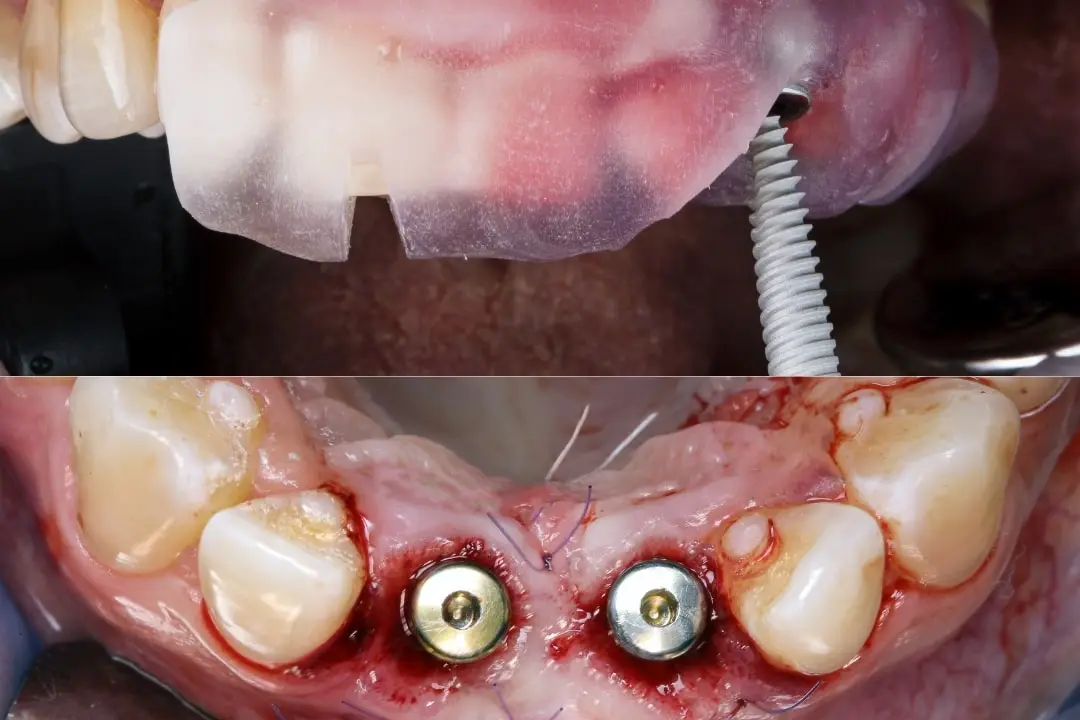Dental implants, such as all on 4 or all on 6, are an effective treatment method that usually ensures long-term success, but failure can occur in some cases. The causes of dental implant failure include several important factors. Factors such as the density and quality of the jawbone where the implant will be placed, the patient's general oral and dental health, current health status, and whether the patient is a smoker or not can directly affect the success of the treatment. If the patient is assessed as a suitable candidate by the dentist, a successful result can be achieved.

However, there are also factors to be considered after implant treatment. Failure to maintain good oral hygiene, improper cleaning of the teeth, and mistakes made during treatment can lead to implant failure. The accuracy of the procedure performed by the dentist and precision and meticulousness in the treatment process are critical to ensure the longevity of the implant.
All these factors should be analysed in detail to determine the responsible of dental implant failure. Correct information and a careful treatment process are of great importance to increase success.
What are the signs of dental implant failure?
Dental implant treatment aims to provide long-term and successful results. However, sometimes implants can fail unexpectedly. In this case, it is important to notice certain symptoms so that early intervention can be carried out. If you suspect that your implant is failing, you should pay attention to the following signs.
- Pain and discomfort: If you feel constant pain when chewing or biting around the implant, this may be a sign of failure. Such discomfort may indicate that the implant is not properly seated.
- Inflammation and swelling: Slight swelling after an implant is normal, but if the swelling continues for several days, this may indicate a risk of infection. Infection can cause the implant to fail, so it should be checked immediately.
- Loosening of implants: If the implant is moving or feels less secure, this should be monitored carefully. Loosening of the implant may indicate a condition that requires surgical intervention.
- Not feeling like natural teeth: We expect the implant to feel like a natural tooth. If you notice a strange feeling or discomfort around the implant, this may be a sign of failure.
If you observe any indications of dental implant failure, please consult your dentist at your earliest convenience. Early intervention ensures that the treatment process progresses smoothly.

Causes of dental implant failure
Infection
Infection called peri-implantitis that occurs around the implant negatively affects the stability of the implant. Inadequate oral and dental hygiene can trigger this condition.
Incorrect placement
Failure to place the implant at the correct angle and position can cause biomechanical problems. Each implant should be positioned specifically for the individual.
Insufficient bone density
Insufficient jawbone prevents the implant from fusing properly with the jawbone. This can lead to failure in the process called osseointegration.
Insufficient oral hygiene
Neglecting oral care after implantation can negatively affect the success of the implant by causing bacterial infections and gum disease.
Smoking
Tobacco products complicate the healing process and increase the risk of implant loss.
Bruxism
Bruxism or clenching the teeth puts excessive pressure on the implant, which can cause the implant to fail.
To prevent dental implant failure, accurate diagnosis and personalized treatment plans are very important. Knowing the risk factors before consulting a specialist and implementing a meticulous care process will support long-term success.
The role of the patient in dental implant failure
The success of dental implants depends not only on the skills of the specialist dentist but also on the active participation of the patient. In order for implant treatment to be successful, patients should adopt correct oral care habits and meticulously follow the recommendations of the doctor.
What are the responsibilities of a dental implant patient?
An implant candidate must be responsible not only during the treatment process but also afterwards. Here are some important steps you should consider for a successful treatment process:
- Inform your medical conditions: It is very important to provide your dentist with full information about your current health condition before having a dental implant. Uncontrolled diseases, especially gum disease and diabetes, can affect the treatment process and the success of the implant.
- Do not skip dentist visits: Regular dentist check-ups ensure that the condition of your implant is monitored and help to resolve potential problems at an early stage.
- Pay attention to your oral hygiene: Good oral care is one of the basic conditions for dental implant success. Brush your teeth regularly, floss, and reinforce your cleaning with mouthwash.
- Avoid bad habits: Habits such as smoking affect the healing process of the implant. Smoking creates a lack of oxygen in the gums, which can cause the implant to loosen. Similarly, biting hard objects can also lead to implant failure.
In conclusion, the patient plays a major role in the success of dental implant treatment. Adequate oral and dental care, regular dental check-ups, and following the dentist's instructions directly affect the success of implant treatment.
The experience of the dental implant surgeon
A successful surgeon should have not only technical knowledge but also knowledge of current technologies and developing methods. It is important for a surgeon to have experience, to be able to cope with all kinds of difficulties, and to provide detailed information to the patient. A reputable surgeon achieves successful results by taking the right steps in the implant placement process.
Surgeon errors and dental implant failure
Implant failures can often be caused by surgeon errors. Incorrectly placed implants, poor quality materials or inadequate planning can lead to disruptions in the treatment process. The surgeon's mistakes can result in the patient facing implant failure.
If a surgeon's mistakes caused the failure of a dental implant, you may be entitled to compensation. The first step is to discuss the details of your case with your lawyer. Your lawyer will meet with the responsible surgeon and present the best course of action.
In conclusion, the role of a dental implant surgeon is not limited to just performing the procedure. A good surgeon reassures the patient at every stage of treatment and increases the success rate.
Ways to prevent dental implant failure
The success of dental implants is a process that both the patient and the dentist must follow carefully. Implant failures can often be caused by several factors. Therefore, when the right steps are taken, the success rate increases greatly.
Precautions to be taken before and after the implant procedure
It is important for the patient to provide a detailed medical history to the dentist before starting the implant treatment. This is necessary to reduce any risks that may be encountered during the procedure. It is critical for the surgeon to follow the correct procedures for a safe and successful outcome. In addition, the high quality of the materials and tools used increases the chances of implant success.
After the implant procedure, patients must strictly follow the instructions given by their dentist. Paying attention to oral hygiene is one of the most important steps to reduce the risk of infection. Daily brushing and flossing will ensure that the implant remains healthy.
The importance of regular follow-up appointments
Regular follow-up appointments after the procedure are of great importance to ensure implant success. During these appointments, the dentist evaluates the health of the tissues around the implant and checks for signs of infection or other complications. If such problems are detected early, the treatment process progresses more healthily and the risk of implant failure decreases.
Routine oral and dental care habits
Regular check-ups alone are not enough to prevent implant failure. In addition, the patient should establish a daily oral care routine and avoid hard foods. Hard-to-chew foods put too much pressure on the implant and can lead to failure over time.
As a result, both the surgeon and the patient need to take meticulous care before, during and after the procedure to ensure the success of the dental implant. These steps help to ensure the longevity and health of dental implant treatment.
How does Acardent Turkey Dental Clinic prevent implant failure?
As Acardent Turkey Dental Clinic, we pay attention not only to the treatment process but also to every stage of this process to prevent dental implant failures. The road to success starts with proper planning and a professional approach. Our clinic aims to provide safe and successful results to its patients by offering treatment with evidence-based methods at every step.
Early diagnosis and precise planning
The first step for successful dental implant treatment in Antalya is correct diagnosis and planning. We use advanced 3D imaging technology and digital planning tools to assess bone density and determine the ideal implant placement. This phase is a critical step to anticipate complications that may occur during treatment and to ensure that the implant is placed in the correct position.
Quality materials and surgical expertise
The quality of the materials used is extremely important for a successful and result-orientated implant treatment. Acardent Turkey uses only FDA approved, biocompatible and high-quality materials. These materials support the stability and longevity of the implant. Furthermore, each implant procedure is performed with surgical precision by our experienced specialists.
Postoperative monitoring and personalised care
After the implant placement is completed, our patients are given clear postoperative instructions, and the healing process is carefully monitored. Follow-up visits are important for the early detection of complications and the successful progress of the treatment process. We also offer our patients personalised guidance on oral hygiene and lifestyle changes. These steps are essential to ensure that the implant remains long-lasting and healthy.
As a result, Acardent Turkey Dental Clinic combines the latest technology and clinical expertise, significantly reducing the risk of implant failure. We accomplish outstanding functional and aesthetic outcomes in this way, assisting our patients in regaining their confidence.
FAQs
Who is responsible for dental implant failure?
The surgeon and the patient are jointly responsible for the success of dental implants. The implant must be placed correctly by the surgeon, and then the patient must protect the implant with regular care.
What should be done in case of dental implant failure?
If a dental implant fails, the first step is to visit a dental clinic and be examined by a dentist. Depending on the situation, the dentist will evaluate options such as removing the existing implant, replacing it with a new one or improving the stability of the existing implant. Early intervention allows the process to be managed more quickly and effectively.
Is dental implant failure common?
Dental implant failures are relatively rare, but this is not completely avoidable. An expert dental surgeon and a good treatment plan during the placement of the implant greatly increase the success rate. It is also important that the patient follows the post-treatment recommendations.
Can a dental implant be removed if it fails?
Yes, a failed dental implant can be removed and replaced with a new implant. However, this procedure should only be performed by a specialised dentist. Furthermore, an appropriate solution should be recommended according to the cause of the failure.
How does the dentist recognise implant failure?
The dentist can detect possible infections, inflammation or other complications by checking the tissues around the implant at regular check-ups. If the symptoms of implant failure are recognised early on, the treatment process can be managed more efficiently and effectively. In conclusion, the cooperation of the surgeon and the patient is crucial to prevent dental implant failures. With proper care and regular follow-up, the success rate of implant treatment increases even more.
